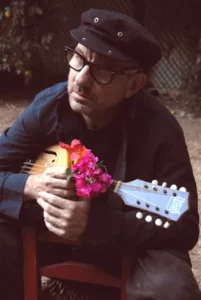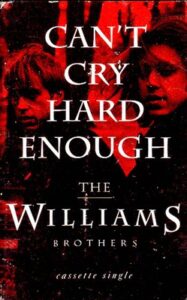Los Angeles songwriter, producer, and multi-instrumentalist Marvin Etzioni will be releasing a 30th-anniversary reissue of his debut album, The Mandolin Man, this fall. It features the song “Can’t Cry Hard Enough,” which has become a folk/Americana standard over the past three decades.
A songwriter is lucky (or maybe not lucky — blessed?) to create a truly timeless song once or twice in a career, the kind of composition that reaches out into the universe as if it has a life of its own. Some timeless songs, like the Beatles’ “Yesterday,” retain their identity through a definitive recording despite being covered and reinterpreted by many other performers. Other songs, like Leonard Cohen’s “Hallelujah,” transcend any specific recorded version, existing within a mysterious and ongoing web of players and listeners beyond the scope of geography and time. “Can’t Cry Hard Enough,” written by Marvin Etzioni and David Williams, is one of the latter.
 I first heard “Can’t Cry Hard Enough” on the Williams Brothers’ 1991 self-titled album, which features songwriting collaborations with Etzioni, best known for his role as bassist and contributing songwriter for the legendary ‘80s Los Angeles cowpunk band Lone Justice. Over the years, as my record collection expanded, I noticed the song resurfacing again and again in recorded versions by Etzioni, Victoria Williams (no relation to the Williams Brothers), Julie Miller, and Tom Freund. Upon further investigation, I found an ever-growing list of artists, events, and films featuring “Can’t Cry Hard Enough.”
I first heard “Can’t Cry Hard Enough” on the Williams Brothers’ 1991 self-titled album, which features songwriting collaborations with Etzioni, best known for his role as bassist and contributing songwriter for the legendary ‘80s Los Angeles cowpunk band Lone Justice. Over the years, as my record collection expanded, I noticed the song resurfacing again and again in recorded versions by Etzioni, Victoria Williams (no relation to the Williams Brothers), Julie Miller, and Tom Freund. Upon further investigation, I found an ever-growing list of artists, events, and films featuring “Can’t Cry Hard Enough.”
I asked Etzioni and David Williams to reflect on their song, as it continues to be performed and recorded around the world.
Did you know when you were writing it that you had tapped into something timeless and poignant?
Marvin: On a night like tonight, when one of my closest friends is in the hospital going through a very complicated surgery, the power of song washes over the soul. When writing the song, I was in the moment. The title came in a flash, and most of the lyrics did too. David, who initiated the opening line and piano mood, inspired a floodgate. The song was written, or channeled, in a very brief moment in time.
David: The song came very quickly to me and Marvin. Sitting at the piano, I had some initial chords and sang the opening line “I’m gonna live my life like every day’s the last.” I was grieving the loss of a friend, and it turned out Marvin had just lost a friend too. He was able to tune into my emotion right away, and we crafted the song in about a half an hour or so. It was an inspired writing session. The song seemed to write itself, fully formed, like a gift from God. Marvin came up with the beautiful words “I’m gonna open my eyes and see for the first time / I’ve let go of you like a child letting go of his kite / There it goes up in the sky / There it goes beyond the clouds for no reason why.”
 The music is just as beautiful as the lyrics. Do you have any comments on the chord changes or melody?
The music is just as beautiful as the lyrics. Do you have any comments on the chord changes or melody?
Marvin: David was behind the piano. I immediately connected to what he came up with. We followed each other until the completion of the song. For the Williams Brothers’ recording, Paul Buckmaster wrote a beautiful string-quartet arrangement. I have the charts and have played it live with mandolin and quartet. One of David’s piano chords I can’t quite figure out on mandolin, so I simplified it.
David and I were on a songwriting binge. Song after song. At the time of completion I really didn’t know this song would get any better reaction to any other. The song chose us to write it.
David: I was playing Pachelbel’s Canon in D Major earlier on the day we wrote the song — the walk-down chords in the verse were inspired by that. I started singing the first verse in a low register — which I think Marvin was encouraging — and by the time the chorus came, I was singing at the top of my range. That dynamic really unleashed the emotion of the lyric. The chords and melody came as effortlessly as the words.
Does it feel like your own, or has it developed a life of its own?
Marvin: I am blessed to be a part of bringing the song into the world. It has developed a life of its own — that’s an interesting way of putting it.
I recall after 9/11 feeling helpless. What could I do in this world to make a difference? I was producing an artist at the time and asked her that question. She said, “It seems you are making a difference.” Without my knowledge, a fan of the song had created images of ground zero after 9/11 with the song as its backdrop. He sent it out to friends to help heal his own heart and possibly the hearts of others. The response was overwhelming, and it crashed his site. I was told it had well over a million hits. You never know how a song will impact someone else.
David: The song has developed a life of its own, and I hope it continues to be recorded and performed. I know it has touched many people. One of my favorite versions is by Judy Collins, who I met after she recorded it. She had lost her son, so the song had real meaning for her. She modified two words in the third verse: “all that remains is just the empty air” instead of “an empty chair.” Now when I sit at the piano I sing “empty air” too.
Marvin: Funny — “an empty chair” is something specific to me. I can still visualize the person and the chair, now empty. I too am glad that Judy Collins recorded the song.
David: It was also recorded in Icelandic by an artist named Snorri. I love that version.
Any other thoughts?
Marvin: Technology will never be able to take the place of a songwriter. Technology will never be able to create a high-powered computer to write a song. It can only create new ways of distributing what we create.
If you are reading this and you are a fan of this song, or any song, reach out to the writer and/or artist. In a world where there is so much to take in, and so little time to do so, it’s a good thing to remind each other how we are impacting each others’ lives.
David: I am most grateful to Marvin for the song we created together!
Marvin: I am grateful to David for opening up the floodgates.
………………………………..
The world is teeming with interpretations of “Can’t Cry Hard Enough” to investigate. Here are two notable recordings, decades apart, with which to begin:
VICTORIA WILLIAMS (1990)
JUDY COLLINS (2014)





Comments